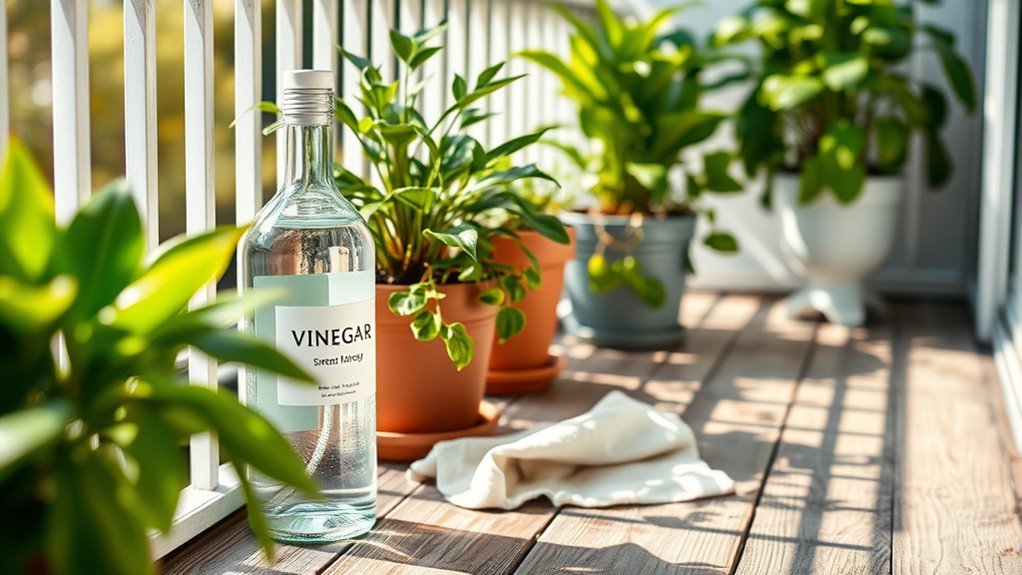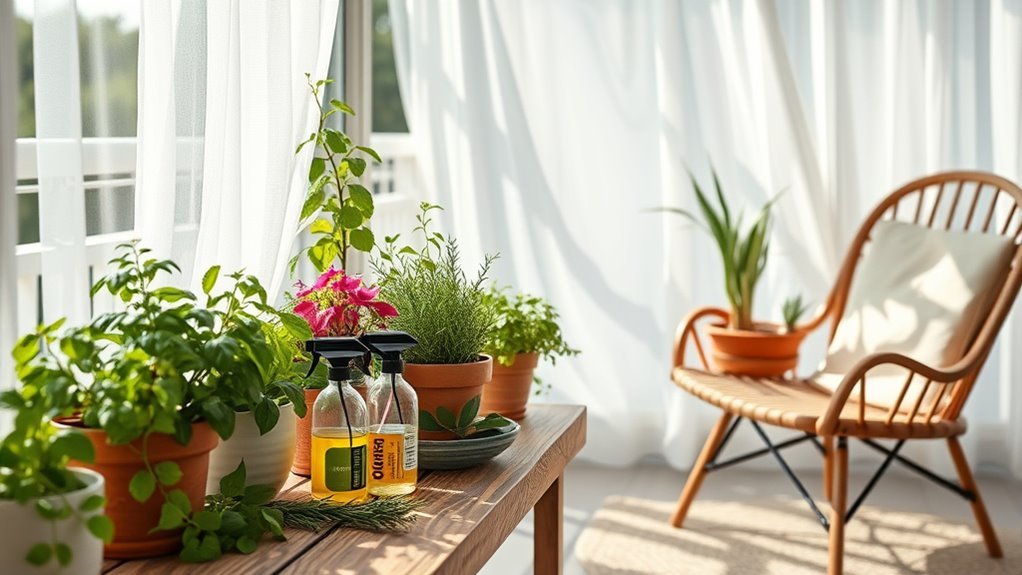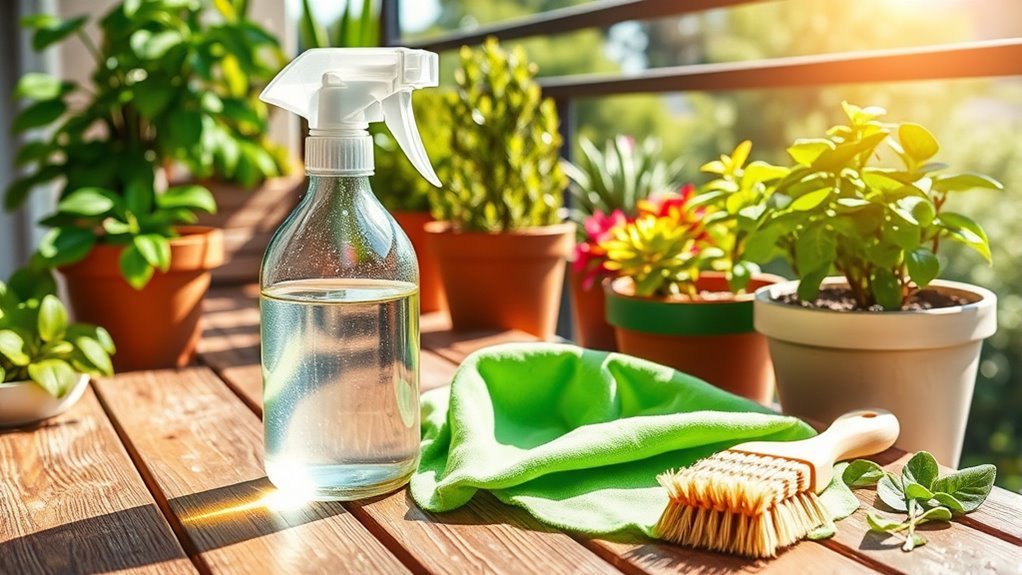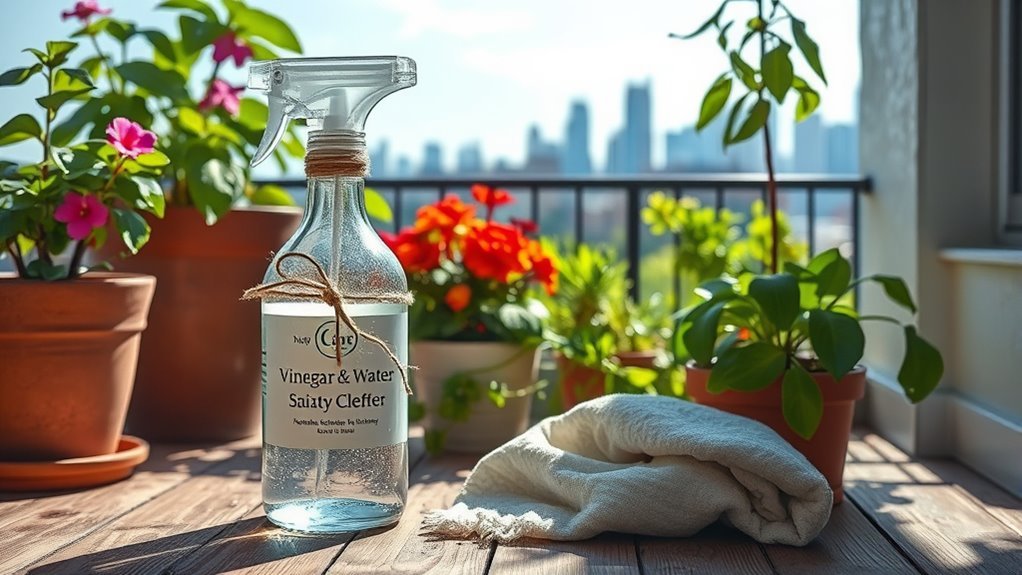Natural Cleaning Hacks for Your Balcony
You can keep your balcony sparkling using natural ingredients like vinegar to break down grime and baking soda as a gentle scrub. Lemon juice works wonders on stains and adds shine, while essential oils freshen the air with a pleasant aroma. Try making an all-purpose cleaning spray with vinegar and water for easy use. For plant pots and mildew, natural solutions keep things fresh and eco-friendly. Stick around to discover more clever and green cleaning tips for your outdoor space!
Using Vinegar to Remove Dirt and Grime

Although vinegar is a common kitchen staple, you might not realize how effective it is at cutting through dirt and grime on your balcony. Its acidity breaks down stubborn stains and leaves surfaces refreshed without harsh chemicals. You don’t have to rely on expensive cleaners that limit your freedom to choose natural methods. Vinegar effectiveness lies in its simplicity—just dilute it with water and spray directly on dirty areas. Let it sit briefly before wiping clean. If vinegar isn’t your style, there are vinegar alternatives like lemon juice or diluted alcohol that also offer natural cleaning power. These options let you maintain a clean balcony while staying true to a lifestyle free from synthetic products and unnecessary toxins. Embrace vinegar and its alternatives for an eco-friendly, effective clean.
Baking Soda as a Natural Scrubbing Agent
You’ll find baking soda’s gentle abrasiveness perfect for scrubbing away stubborn dirt without damaging your balcony surfaces. By mixing it with a bit of water, you can create an effective paste that tackles grime with ease. Just make sure to test it on small areas first to keep everything safe and scratch-free.
Baking Soda Benefits
A simple pantry staple like baking soda can transform your balcony cleaning routine. Its natural abrasive texture makes it perfect for scrubbing away dirt and grime without harsh chemicals. You’ll love how versatile baking soda is—baking soda uses go beyond just cleaning; it deodorizes, brightens surfaces, and even tackles stubborn stains. When mixed with water or vinegar, baking soda recipes create effective, eco-friendly cleaning solutions that give you freedom from toxic products. Plus, it’s affordable and gentle on your plants and outdoor furniture. By incorporating baking soda into your cleaning arsenal, you’re choosing a safer, sustainable way to refresh your balcony space effortlessly. Embrace these benefits and enjoy a cleaner, healthier outdoor haven without compromising your values.
Effective Scrubbing Techniques
Baking soda’s gentle abrasiveness makes it ideal for scrubbing away dirt and grime without damaging surfaces on your balcony. To get started, combine baking soda with a bit of water to create a paste. Using scrubbing materials like a soft-bristle brush or a microfiber cloth, apply the paste in circular motions. This method lifts stubborn stains while protecting your balcony’s finish. For tough spots, let the paste sit for a few minutes before scrubbing to maximize effectiveness. Remember, effective techniques rely on consistent pressure and patience rather than harsh chemicals or excessive force. By mastering these simple steps, you’ll keep your balcony fresh and clean, all while embracing natural, safe cleaning habits that give you the freedom to enjoy your outdoor space hassle-free.
Safe Surface Usage
When using natural scrubbing agents like baking soda, it’s important to know which surfaces can handle its mild abrasiveness. You want to practice safe cleaning without damaging your balcony’s materials. Baking soda works wonders, but only on certain surface types.
Here are three surface types where baking soda shines as a scrubbing agent:
- Ceramic tiles – Baking soda gently lifts dirt without scratching the glaze, keeping tiles vibrant.
- Metal railings – It removes grime and rust spots safely, preserving the metal finish.
- Plastic furniture – Baking soda cleans marks and stains effectively without causing wear.
Avoid using baking soda on delicate surfaces like wood or glass, as it may cause scratches. Knowing your surface types helps you clean freely and smartly.
Lemon Juice for Stain Removal and Shine
Lemon juice is a natural cleaner that’s great for removing stains and adding shine to your balcony surfaces. You can apply it directly or mix it with water for a gentler solution. Just remember to test a small area first to avoid any damage.
Lemon Juice Benefits
Although citrus fruits are often overlooked as cleaning agents, their juice packs a powerful punch against stains and dull surfaces. Lemon juice’s natural cleaning properties make it a must-have for anyone wanting a fresh, vibrant balcony without harsh chemicals. When you use lemon juice, you’re tapping into its:
- Natural acidity – breaks down grease and stubborn stains effortlessly.
- Antibacterial qualities – help sanitize surfaces while leaving a fresh scent.
- Natural bleaching effect – restores shine to metal, glass, and tiles without damage.
Using lemon juice lets you clean freely and eco-consciously, giving your balcony a bright, inviting vibe. Its versatility means you can tackle many cleaning challenges with one simple ingredient—freeing you from complicated, toxic products. Embrace lemon juice and enjoy a naturally gleaming outdoor space.
Application Tips
A simple squeeze of lemon juice can quickly tackle stubborn stains and restore shine to your balcony surfaces. To make the most of this eco friendly product, apply lemon juice directly to the stain, let it sit for 5-10 minutes, then scrub gently with a soft brush or cloth. This method fits perfectly with balcony organization tips that promote natural, clutter-free spaces.
| Step | Tip |
|---|---|
| 1. Prep surface | Clear debris for better lemon contact |
| 2. Apply lemon juice | Use fresh juice for maximum effect |
| 3. Wait | Let it sit 5-10 minutes |
| 4. Scrub | Use soft brush or cloth |
| 5. Rinse & dry | Rinse with water and air dry |
This routine keeps your balcony fresh and shining without harsh chemicals.
Essential Oils for a Fresh Balcony Aroma

When you want to create a pleasant atmosphere on your balcony, essential oils can be a simple and effective solution. Using aromatic blends in scent diffusers allows you to enjoy fresh, natural fragrances without harsh chemicals. Here’s how to get started:
- Choose your blend: Opt for invigorating scents like lemon, eucalyptus, or lavender to match your mood and style.
- Use scent diffusers: Electric or reed diffusers gently disperse your chosen oils, keeping the air fresh all day.
- Refresh regularly: Replace oils every few weeks to maintain a vibrant aroma, ensuring your balcony always feels inviting.
Homemade All-Purpose Cleaning Spray
Since you want a safe and effective way to keep your balcony spotless, making your own all-purpose cleaning spray is a great choice. Using simple homemade ingredients like white vinegar, water, and a few drops of essential oils, you can create a powerful spray that tackles dirt and grime without harsh chemicals. These spray recipes are easy to customize—add lemon juice for extra freshness or tea tree oil for natural antibacterial properties. Just mix equal parts water and vinegar, then add your preferred essential oil. Pour it into a spray bottle, and you’re set. This homemade solution gives you freedom from store-bought cleaners, letting you maintain a clean balcony while respecting the environment and your health. It’s efficient, natural, and economical.
Cleaning Outdoor Furniture Naturally

When your outdoor furniture gets grimy, vinegar works wonders on stubborn stains without harsh chemicals. You can also make a gentle baking soda scrub to lift dirt without damaging surfaces. Finally, lemon juice acts as a natural disinfectant, leaving your furniture fresh and clean.
Vinegar for Stubborn Stains
A simple bottle of vinegar can be your best ally against stubborn stains on outdoor furniture. Its natural acidity tackles grime without harsh chemicals, giving you freedom from toxins while keeping your balcony fresh. Here’s how to maximize vinegar applications for stain prevention and removal:
- Mix equal parts vinegar and water in a spray bottle for a powerful, eco-friendly cleaner. Spray on stains, let sit 10 minutes, then scrub gently.
- For tougher marks, apply undiluted vinegar with a cloth, allowing it to work before rinsing.
- Regularly wipe furniture with diluted vinegar to prevent stains from setting, maintaining your space’s natural beauty.
Using vinegar this way gives you control over your cleaning routine—simple, effective, and kind to the environment.
Baking Soda Scrub
One effective way to refresh your outdoor furniture is with a baking soda scrub. Baking soda benefits go beyond the kitchen; it’s a powerful, natural cleaner that lifts dirt and grime without harsh chemicals. To get started, mix baking soda with a little water to form a paste. Apply it to your furniture’s surface, then scrub gently with a soft brush or cloth. This method tackles stains and neutralizes odors, making your balcony feel fresh and inviting. Baking soda applications are versatile—you can use it on plastic, metal, or wooden furniture safely. Best of all, it’s eco-friendly and affordable, giving you freedom from synthetic cleaners while keeping your outdoor space spotless and healthy. Give your furniture a natural boost with this simple baking soda scrub.
Lemon Juice Disinfectant
Besides baking soda, lemon juice is another natural cleaner that works wonders on outdoor furniture. It’s a powerful natural disinfectant that not only cleans but also leaves a fresh scent, making your balcony feel inviting without harsh chemicals. You can easily harness its benefits by:
- Mixing equal parts lemon juice and water in a spray bottle for a simple disinfectant spray.
- Applying lemon juice directly to tough stains and letting it sit for 5-10 minutes before scrubbing.
- Combining lemon juice with olive oil to polish wooden furniture, protecting it while enhancing its natural shine.
Using lemon juice frees you from synthetic cleaners, giving you a safe, eco-friendly way to keep your outdoor space sparkling and fresh.
Eco-Friendly Ways to Clean Plant Pots
Although it might seem tedious, cleaning your plant pots eco-friendly is easier than you think and benefits both your plants and the environment. Different plant pot materials like terracotta, plastic, or ceramic each need gentle care. Start by scrubbing pots with a mixture of warm water and vinegar, an eco friendly alternative to harsh chemicals. For stubborn stains, baking soda adds a natural abrasive kick without harming the pot or soil. Rinse thoroughly to avoid residue that could affect new plants. If you’re dealing with plastic pots, sunlight and fresh air can also help sanitize them naturally. Embracing these eco friendly alternatives not only keeps your balcony vibrant but also lets you enjoy gardening with freedom, knowing you’re protecting the planet while nurturing your green space.
Sweeping and Dusting Without Chemicals
When you want to keep your balcony clean without relying on chemicals, sweeping and dusting can be surprisingly simple. Embracing chemical alternatives lets you enjoy outdoor cleaning that’s safe and effective. Here’s how you can do it:
- Use a soft-bristle broom to sweep away dirt and leaves gently, avoiding damage to surfaces.
- Dust with a microfiber cloth or a natural fiber duster to trap dust without spreading it around.
- For stubborn dirt, dampen your cloth with plain water or a mix of water and a few drops of lemon juice or vinegar—natural, non-toxic options.
These methods keep your space fresh without compromising your freedom from harsh chemicals. You’ll find outdoor cleaning can be both easy and eco-friendly.
Natural Solutions for Mold and Mildew
If mold and mildew start appearing on your balcony, you don’t have to reach for harsh chemicals to tackle them. You can use natural solutions that are both effective and safe. For mold prevention, keep your balcony dry and well-ventilated, as moisture fuels growth. During mildew treatment, try spraying a mixture of equal parts white vinegar and water onto affected areas. Let it sit for about an hour before scrubbing with a brush. Another powerful option is baking soda; sprinkle it directly on mildew, scrub gently, and rinse with water. These natural remedies allow you to keep your balcony clean without compromising your freedom from toxins. By embracing these simple, natural methods, you maintain a healthy outdoor space that feels fresh and inviting every day.
Maintaining Your Balcony Floor With Natural Products
Keeping mold and mildew at bay is just one part of caring for your balcony. To truly enjoy your outdoor space, you need effective balcony maintenance tips that focus on preserving your floor naturally. Here’s how you can do it using natural floor cleaners:
Maintaining your balcony floor naturally is key to enjoying a clean, fresh outdoor space free from mold and mildew.
- Vinegar and Water Solution – Mix equal parts white vinegar and water to mop your floor. It cleans grime without harsh chemicals.
- Baking Soda Scrub – Sprinkle baking soda on stubborn stains, then scrub gently with a damp brush to lift dirt and refresh surfaces.
- Lemon Juice Rinse – Use lemon juice mixed with water as a final rinse to brighten floors and leave a fresh scent.
These simple, natural methods keep your balcony floor clean and free, letting you enjoy your space without worry.
Frequently Asked Questions
How Often Should I Deep Clean My Balcony Naturally?
You should aim to deep clean your balcony naturally about once every two to three months. This cleaning frequency keeps your space fresh and well-maintained without feeling like a chore. Balcony maintenance isn’t just about looks—it’s about creating a freeing, enjoyable outdoor spot. Regular upkeep prevents buildup and lets you fully relax in your personal oasis, enjoying nature without harsh chemicals or stress.
Can Natural Cleaning Harm Delicate Balcony Plants?
Think of your delicate balcony plants as fragile butterflies—they need gentle care to flutter freely. Using harsh chemicals can threaten their plant safety, so opting for natural cleaning alternatives like diluted vinegar or gentle soap keeps their environment safe. You’ll want to avoid direct contact with leaves to preserve their freedom to grow. By choosing mindful methods, you protect your plants while keeping your balcony fresh and inviting.
What Natural Products Repel Insects on Balconies?
If you’re looking to keep insects away from your balcony naturally, essential oils like citronella, peppermint, and eucalyptus are your best friends. You can mix a few drops with water in a spray bottle and spritz around your space. Another great option is vinegar spray; it’s easy to make and works as a natural repellent. These products let you enjoy your outdoor freedom without harsh chemicals.
How to Store Homemade Natural Cleaning Solutions Safely?
Think of storing your homemade solutions like tucking away treasured letters—each deserves a clear envelope. You’ll want to use glass containers to keep your mixtures safe and fresh, preventing any chemical reactions or leaks. Don’t forget storage labels; they’re like your freedom’s roadmap, guiding you effortlessly. Label every bottle with the contents and date, so you’re never guessing. This way, your cleaning arsenal stays organized, effective, and ready whenever you need it.
Are Natural Cleaning Methods Effective on Balcony Glass Railings?
You might wonder about the effectiveness comparison between natural cleaning methods and traditional ones on glass railings. You’ll find natural techniques just as effective, especially when you use ingredients like vinegar or lemon juice. These not only clean but leave your balcony glass sparkling without harsh chemicals. By mastering glass railing techniques with natural solutions, you’ll enjoy a cleaner space while feeling free from toxic residue. It’s a win for you and the environment!






